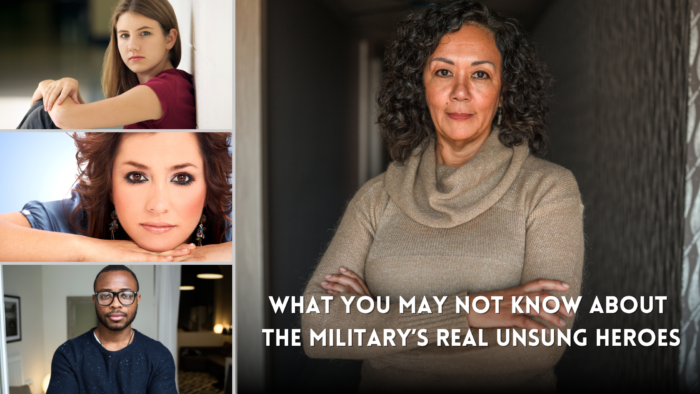By Donna Hoffmeyer
(original post on Medium, Taking Off The Armor)
(‘She” is used in this story, but in reality there are a lot of “hes” rocking it out too.)
Short notice deployment popped up; he’ll be out the door in less than two weeks. He’s running concurrent thoughts in his mind.
I’ll miss the holidays…again. I need to get new boots.
Glad the kids are in school, it will keep their minds occupied. I need to switch out to a new holster.
Wonder if her Mom is willing to stay past the holidays to help her out. Damn, where did I put that go bag?
Maybe I should get her a housekeeper for Christmas. I need to write my “just in case” letters and give them to my buddy to hold.
I hope the kids will be okay. New winter gear, hope Supply has the ones I like.
I hate leaving them again. Let’s go, duty calls.
And then he’s gone….
In a matter of days, she has reorganized her schedule, coordinated with other parents to handle after-school sports and activities;, gave her work a heads up that she will need some flexibility, informed the teachers Dad is deploying, and started pep talking to the kids.
It is never easy, but she doesn’t have time to worry about it. If she falls apart, the kids will too. Her mantra to them is the same. This is the life we live, and we have to make the best of the tough times. Just like every deployment, she knows she sets the tone for their memories. This deployment feels heavier for some reason. She shrugs it off, rationalizing it was short notice, and didn’t have much time to adjust
They never receive the letters he wrote. They received a phone call instead.
Is this Mrs. M? Yes? This is Maj X. I am sorry to let you know your husband was involved in an IED explosion. He is in serious condition and will be flown to Germany once he is stabilized.
The wind has been taken from her lungs. What does she tell the kids? How bad is it? She mentally marks this as the worst day in her existing life and reminds herself what she tells the kids. This is the life we live, and we have to make the best of the tough times.
*******************************************************************
He survived the IED explosion…and in her mind that makes them the lucky ones. The other five in the convoy did not make it. She shudders thinking about the five families that received a very different notification than her. Their notification had no hope.
He lost his left leg above the knee, his right hand at the wrist, TBI, and hearing loss in his left ear. After 18 months of rehab at Walter Reed and the Center for Intrepid, he is finally home. Eighteen months of hotel room living, quick meals, stressful days watching him learn basic skills, cheerleading him on, keeping stable for the kids, and crying in the safe space of her bed at night. She is grateful for the Fisher House, and all the support she received from other families there, but would be happy to not see the inside of one for a while. She is looking forward to getting back to their life.
However, she slowly realizes their life does not exist anymore.
The house has to be modified to make it easier for him to function. There are new accessories. Doctor’s appointments, medication refills, physical therapy, occupational therapy, specialists, consults, and case managers; on top of maintaining a routine for the kids, after-school activities, helping them adjust, easing their fears, understanding their random acting out, and being their rock. In between, trying to figure out if they can financially survive without her income.
With two of them, it is chaotic, but it can be managed. However, it is not two of them. It is only her. The physical injuries were not the worst of the injuries. They will heal, he will learn to use prosthetics, and can physically engage back into life. The worst of the injuries are the mental injuries, the ones they can put a mental, poorly adapted mask over, and allow the outside world to believe they are functioning.
PTSD, survivor’s guilt, anxiety, and depression…those are not relieved with pain medication. Though she wishes it were that simple. She cannot hug away the nightmares. Oftentimes, she doesn’t sleep deep for fear he will swing during a dark dream and make contact with her. It already happened once. Fortunately, she was on her side and he just grazed her hip.
She is his rock, as well as the kids. She keeps scanning the environment for potential triggers and tries to mitigate possible situations. She finds the booth in the corner, so his back is to a wall, and they can enjoy a meal without him constantly looking over his shoulder. It still is not very relaxing, as she watches him scan the room continuously, but it is a nice change of pace. Typically, she wants to make it easier for everyone and just does takeout.
She is his case manager. She makes the appointments and schedules medications because his memory is spotty. She talks to the providers, explaining what she is seeing; advocating, collaborating, and chauffeuring. She keeps meticulous records of every appointment, every prescription, and every note that has been written. She will even keep her notes to remember the next step.
She is his counselor. The one that is allowed to be around when he falls apart. She helps him quell the anxiety and keeps him in the present. She tells him often he is loved and valued because she truly does love and value him…but also to encourage him to keep in the fight.
She is the protector. She keeps the outside world away from them, so as not to overwhelm him. She bakes the cookies for the kids’ school bake sale and puts on a happy face when she delivers them. A smile stops them from asking too many questions. And when she is asked how she and the family are, she downplays it. They do not want to know all the discourse, and it would lead to discussions she does not have the time or energy to offer.
She is a fighter. She refuses to give up. Like a focused warrior, she is determined to keep her family moving forward. She has put herself on the back burner; not as an intentional martyr, but because her family is her priority. There is no time to stop. Besides, she’s afraid if she does stop, she may never start again. When it is all too much, she finds solace in her walk-in closet for a quick cry.
She is tired. She is not immune to the wear and tear of being a caregiver. She has days when she doesn’t want to care; days when she wishes the chaos would all stop; days she just wants to nap. She has days where she wonders if she is too enabling. Is he not functioning because she is functioning too much?
She is afraid. She has days wondering if there is an end in sight, or if this is their new normal. She is scared he will follow through on his emotional threats one day. She is worried she or the kids will walk in one day and see the unspeakable.
This is the life of a military caregiver. These are the unsung heroes of the military.
**************************************************************
Caregivers Are Critical
There are over 5.5 million military caregivers in the US. You have probably met one, but there is a chance you never knew it. They are the wives, husbands, partners, children, friends and family. They are our silent angels. Over the last several years, the military has started to recognize their importance in the holistic care of the injured service member.
They are critical to an optimal recovery. In my last position before retirement, I saw firsthand the importance of the caregiver, and how instrumental they are in the veteran’s level of recovery. I distinctly remember two situations where there was no family or friends to be in the caregiver role. One continues to suffer from significant mental health injuries and the other did not survive. I cannot help but wonder what their outcome would have been, had they had a caregiver to support them.
However, it takes a significant toll on the caregiver. Many suffer from depression, anxiety, and compassion fatigue. Marriages are strained. Children begin to suffer mental health issues, adding to the already elevated stress level. It is hard for the caregiver to get a break, as the veteran leans on them for their main support. Support for the caregiver is crucial for the caregiver to continue their role in a healthy manner.
Support can come in many forms — respite care, resources, and education all aid both the caregiver and the Veteran. Below are just a few of the many resources available to caregivers.
2019 Caregiver Resource Directory
A Mother’s Rest (Retreat)
Military Caregivers Program (Retreat)
Semper Fi and American Funds (Support/Retreats)
Operation Homefront Veteran Caregiver Support
The Weight Of Honor (Caregiver movie and website of resources)
So, to all our badass caregivers out there….the whole 5.5 million of you…THANK YOU! Thank you for taking care of our service members and veterans. Thank you for hanging in there through the ups and downs. Thank you for taking a breath, instead of throwing in the towel. Thank you for coming back the next day, and the next day, and the next day…without fail. Thank you, thank you, thank you.


